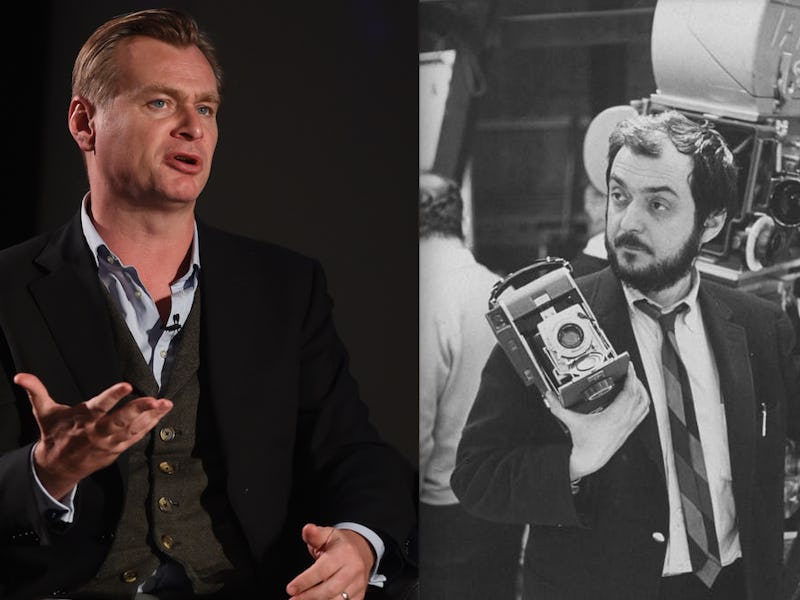How ‘Dunkirk’ Proves Christopher Nolan Is Stanley Kubrick's Cinematic Heir Apparent
Nolan eases into the war-movie tradition and makes the case as Kubrick's next-in-line.

It must be great to be Christopher Nolan. Youre a once-obscure filmmaker who earned the right to make the movies you want by the good old-fashioned combination of box office hits that made their money without giving up what made them unique. It also helped that he re-wrote the cinematic language for the modern comic book movie in the process, but it was mostly because Nolan remained an auteur throughout his escalating filmography. For better or worse, you could sit down in a theater, watch the characters, score, cinematography and more merge into the perfect aesthetic that screamed “This is a Christopher Nolan movie.” Now that he’s going back to World War II with his newest film Dunkirk, it’s obvious that he’s in the true company of another major filmmaker: Stanley Kubrick.
Plenty of directors have been compared to Kubrick over the years, so much so that it’s become kind of a joke unto itself. David Fincher demands at least 50 takes for every shot, so he’s the next Kubrick. Darren Aronofsky’s biblical obsession with themes of fate and god and what not just means he’s Kubrick’s heir. The perfectly framed films of Paul Thomas Anderson that pointedly highlight the dark side of humanity? You guessed it: Dude is the next Stanley K.
It seems anybody just out of NYU or USC who throws symmetrical framing and classical music into a movie these days means they’re the next Kubrick. The comparisons to others have become so commonplace that it approaches being meaningless, yet Nolan corresponds to Kubrick in a number of more legitimate ways, starting with the movies themselves.
The approach and techniques may be different — so are the plots — but most of Nolan’s work has tangential similarities to Kubrick’s own output. Following and Memento recall the time-twisted noir of The Killing. Insomnia and the Dark Knight Trilogy mirrors Nolan’s easy jump to studio filmmaking with a personal touch like Kubrick’s Spartacus. The Prestige is a period piece jaunt slyly told through a modern lens like Barry Lyndon.Inception and Interstellar couple the personal branding and technological trickery of something like 2001, with Nolan’s latter film taking more than a few details wholesale from Kubrick’s groundbreaking sci-fi masterpiece. They’re also both exceedingly comfortable genre chameleons.
It seems Nolan is approaching his next film with a knowing nod toward Kubrick and others. Dunkirk is the type of movie every major auteur of a certain mold needs to make. The war movie has been an essential part of the cinema since the format began over a century ago, and it’s the type of thing that if you want to run with the cinematic big dogs you have to make your big on-screen statement about how war is hell. Wartime conflict is fertile ground for storytelling, and there’s a reason filmmakers have used it as a cinematic framework to tell the thousands (maybe millions) of different stories it engenders.
Kubrick’s second and most well-known war movie came toward the end of his assured career with 1987’s Full Metal Jacket, which was a purposefully disjointed look at the American quagmire in Vietnam, and was released when Kubrick had proven himself on-screen many times over. Dunkirk, similarly, comes after Nolan has established himself as a pillar of the modern film industry. He can pick and choose as he pleases, and will explore the British wartime quagmire of Operation Dynamo, the 1940 allied evacuation of Nazi-occupied France. Specific details are scarce but Nolan’s sprawling cast — including Tom Hardy, Cillian Murphy, Mark Rylance, and, bizarrely enough, One Direction singer Harry Styles — also seems to hint that it’ll be a typically fragmented but semi-personal view of a larger turbulent conflict à la Full Metal Jacket.
There are plenty of reasons why Nolan isn’t perfectly aligned with Kubrick — In 2010 the Guardian even listed five reasons for and against it — but the fact that the dissent has only quieted down from the time of Inception onwards points to the continued inevitable similarities of both filmmakers’ auteurist autonomy. The skeptic’s question is: Who really cares who is the next Kubrick anyway? If you’re a figure that looms as large as Kubrick then comparison’s are necessary. A monarch needs a successor, doesn’t he?
Kubrick made his war movie when he was 59 years old. Nolan is only 45 heading into Dunkirk, so he hopefully has a lot of filmmaking ahead of him. We can’t wait to see how outrageous his version of Eyes Wide Shut will be.